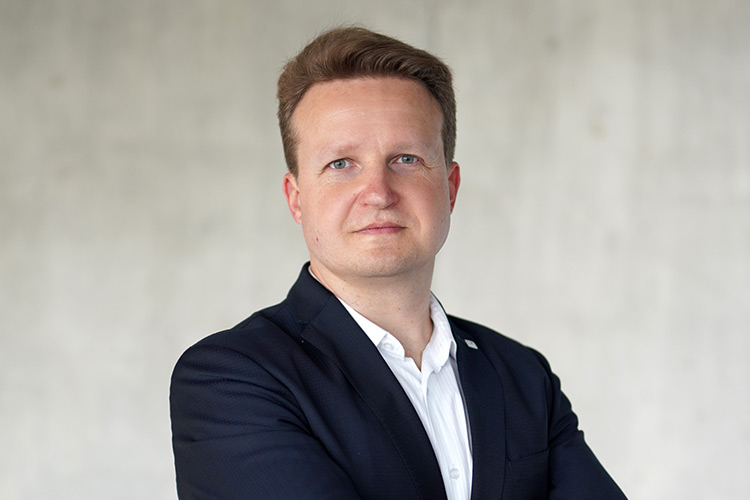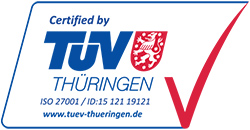Check .lt domain
KTU experts: incorrectly spelled domain names and unwanted Lithuanised software
According to the data of the Internet Service Centre DOMREG at Kaunas University of Technology (KTU), out of 242 thousand registered .lt domains, only approximately 2100, or only 0.9% of them, use the Lithuanian alphabet letters ė, ą, ę, į, ų, ū, č, š, ž. Most Lithuanians use incorrectly spelled domain names without diacritics for their websites.
According to KTU experts, incorrect spelling by Lithuanians is massive on social networks. Moreover, they avoid localised software, which has become the subject of ironic jokes. The demand for such software is said to be low due to the poor quality of the translations into the Lithuanian language, which are often machine translations and related to the wish to save money on the services of the translator-localisation specialist.
Why do people spell domain names incorrectly?
Tomas Mackus, Head of KTU Internet Service Centre DOMREG, thinks that the incorrect spelling of domain names has become common due to the possibility of using only English letters in the internet addresses at the beginning of the internet era, and later due to the lack of knowledge and developed infrastructure, when social networks, email and other systems are not adapted for the use of the domains with Internationalised Domain Names (IDN).
“Many people probably do not know that it is possible to register domains with the names containing Lithuanian letters. If someone decides to register such a domain, the IDN domain is often not renewed after a year because it is not used. And it is not used because the registrars have not created a comprehensive infrastructure for convenient and smooth operation of such domains for websites, email and other services”, – says T. Mackus.

The use of IDN domains requires not only application software for computers and mobile devices but also web hosting and email servers adapted to multilingual environments.
KTU Internet Service Centre DOMREG adapted the .lt domain administration and the Domain Name System (DNS) systems to multilingual environments in 2004. The first created IDN domains were baldųnamai.lt, židiniai.lt and šildymas.lt.
The website of competitors instead of the preferred one
According to T. Mackus, people got used to typing the website address in the Google search box instead of the address field of their web browser designated for this purpose. Moreover, it is common to write a shorter domain name or just a brand name instead of the full domain.
“This has become a habit that discourages correct typing, as Google search results show links to the websites regardless of whether the query was spelled correctly or not. Such a habit leads to the risk of being misdirected to competitors' or even fake websites.
We have seen cases where two competing websites are accessed under the same name, only one of them has an incorrectly spelled domain name, and the other one has a correctly spelled domain name with Lithuanian letters. If the IDN domain is left vacant and only the incorrectly spelled one is used, competitors can take advantage of this by creating their own domain. This is especially dangerous when the domain name is a generic word,” – warns T. Mackus, Head of KTU Internet Service Centre DOMREG.
Incorrect spelling on the radio is the sad norm
The respondent assures that a lot of confusion is caused by the incorrect spelling on the radio, when the brand is pronounced correctly, and the website address is announced with an incorrect spelling.

Tomas Mackus, Head of KTU Internet Service Centre
“I have often heard the product advertisements on the radio that end with an invitation for the people to visit the website, and the brand name is spelled incorrectly. This has become a sad norm, and the situation has not changed for many years,” – says T. Mackus with disappointment.
If a brand name contains the distinctive Lithuanian letters ą, č, ę, ė, į, š, ų, ū, ž, one should register both options of the domain - an IDN domain, e.g., gražus-vardas.lt, and an incorrectly spelled domain using only Latin letters, e.g., grazus-vardas.lt. With both options of the domain name, a redirection to either one should be made, making it easier for visitors to access the website and avoid incorrect spelling in the brand communication.
Incorrectly spelled messages not only on the social networks
Assoc. Prof. Dr. Dainora Maumevičienė, a researcher at the Faculty of Social Sciences, Arts and Humanities of KTU, has noticed a widespread phenomenon of incorrect spelling not only on social networks but also in emails of state institutions.
“The refusal to use the Lithuanian diacritics is particularly prevalent on social media, where users who have accounts comment, share experiences, and write texts incorrectly. They often use an excuse that it is inconvenient to write in Lithuanian characters and the keyboards of smartphones or mobile apps are not adapted for correct spelling.
Surprisingly, Lithuanians also spell incorrectly when replying to emails, which are considered to be official documents, especially when using mobile devices or smartphones to write replies or letters. It is baffling when even representatives of state institutions write an incorrectly spelled reply, despite the requirement to speak and write in the correct official state language,” – says Assoc. Prof. Dr. D. Maumevičienė.
According to the scientist, the habit of incorrect spelling has become widespread in formal emails, not only because of the ability to reply quickly using any mobile device, but also because attitudes towards emails have changed.
“People reply to emails in a similar way they do while messaging on chat apps such as Viber, Messenger, WhatsApp, etc. In some cases, the format for writing and replying to emails has turned into a conversation or a chat: it lacks a greeting, sender’s signature and other attributes,” – notes the respondent.
Lithuanians avoid Lithuanised software
Assoc. Prof. Dr. Dainora Maumevičienė, a researcher at the Faculty of Social Sciences, Arts and Humanities of KTU, draws attention to another problem - the refusal to use localised software due to the poor quality of translations into the Lithuanian language.

Assoc. Prof. Dr. Dainora Maumevičienė, Researcher at the Faculty of Social Sciences, Arts and Humanities of KTU
“Both the linguists’ and software developing communities discuss and make decisions in isolation, without inviting each other into the discussion and co-working. There is no common agreement and perhaps not even the wish to have discussions. Software is often localised by people who are not even translators.
Before the emergence of the first localisation services, many companies that provided translation services were called translation agencies. As the need for software localisation emerged, they started calling themselves the companies providing localisation services, aiming to occupy a larger market share. However, in reality, some of these companies still do not provide these services today; they only provide regular translation related tasks.
Due to the small market, the absence of an open dialogue and other reasons, localisation in Lithuania is not perceived the way it should be. For example, Ireland has large localisation centres, where customers of software products, software developers, potential end users and translators-localisation specialists co-work together. This enables discussions and more flexible access to the localised product, resulting in higher-quality translations,” – explains Assoc. Prof. Dr. D. Maumevičienė.
According to the scientist, many errors in software translations are caused by the use of machine translation. Even though machine translation and artificial intelligence are improving rapidly, it is not possible to expect a high-quality translation into the Lithuanian language using such tools, both because of the peculiarities of the Lithuanian language as one of the oldest and archaic Indo-European language and the limited resources available since the Lithuanian language is still a low-resourced language.
In 2021, researchers of the Language and Technology Research Group at the Faculty of Social Sciences, Arts and Humanities of KTU conducted a study to find out the attitudes of the users of machine translation towards the quality and use of machine translation. The study revealed that more educated respondents are not satisfied with the quality of machine translation, and more than half of the respondents do not rely on it.
Poorly localised content on websites
Besides the incorrect spelling in domain names, social networks and poor software translations into the Lithuanian language, KTU experts also notice the lack of professionally localised Lithuanian websites for foreign markets due to insufficient knowledge of foreign languages and misuse of machine translation.
“We were contacted by the representatives of a company that produces chips and cereals requesting to inspect whether their website for foreign markets is properly localised. As part of their internship and working together with the company’s representatives, our master’s students of the study programme Translation assessed the quality of the content of the websites adapted for foreign markets in Lithuanian, English and Spanish languages. The inspection revealed errors in spelling, grammar, style, inaccurate use of terms and other errors, which had to be corrected immediately”, – Assoc. Prof. Dr. D. Maumevičienė, a reseacher at the Faculty of Social Sciences, Arts and Humanities of KTU, shares her experience.
According to the scientist, when designing websites, their proper adaptation and localisation to the specific target country, its language and culture is not a priority and people still do not understand that high-quality content and translations in the foreign language are an important part of communication with the consumers of the target market and results in brand-related consumer trust and brand image and business reputation.
“High-quality translation ensures communication with the consumer in that country; therefore, misspelling, incorrect and poor language is damaging for a business reputation. A good example is IKEA company and the content on its websites, which is adapted for different markets and languages. The Scandinavian furniture manufacturer and retailer tries to find solutions to even the most complex product names, which are highly metaphorical. This is a completely different manufacturer’s approach to the consumer and; at the same time, it indicates respect to the consumer, the market and the country,” – says Assoc. Prof. Dr. D. Maumevičienė.
Published 2025-04-14



